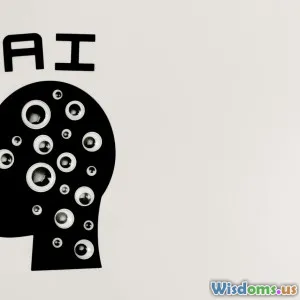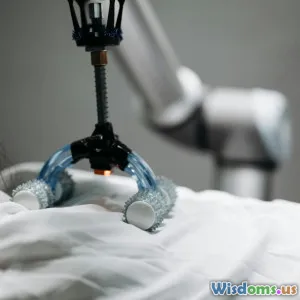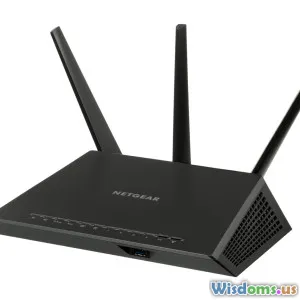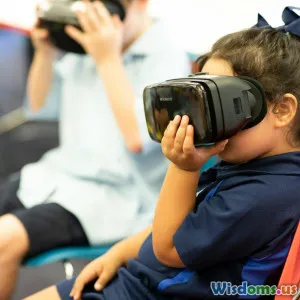
The Role of AI in Space Exploration
7 min read Explore how AI revolutionizes space exploration, enhancing missions, data analysis, and autonomous decisions beyond Earth. (0 Reviews)
The Role of AI in Space Exploration
Introduction
Imagine a spacecraft hurtling millions of miles from Earth, making split-second decisions without human intervention. Or picture autonomous robots roaming the Martian surface, analyzing terrain, and sending back valuable scientific data—all powered by artificial intelligence (AI). The cosmos, vast and enigmatic, holds countless mysteries, but our ability to explore it relies heavily on AI’s revolutionary capabilities. This article delves deep into the crucial role AI plays in space exploration, transforming how we discover and understand the universe.
The AI Revolution in Space Missions
Autonomous Spacecraft and Decision-Making
Spacecraft are inherently limited by the time lag in communication. For example, signals from Mars take between 4 to 24 minutes to reach Earth. This delay prohibits real-time control of space vehicles. Here, AI offers a game-changing solution by enabling spacecraft to operate autonomously.
NASA’s Mars rovers, including the Curiosity and Perseverance, are equipped with onboard AI systems to navigate uneven terrain, avoid hazards, and select scientifically interesting rock samples. The AI algorithms process camera inputs and sensor data instantaneously, making critical navigation decisions without waiting for human commands. This independence extends mission durations and reduces risks.
Advanced Data Analysis in Astronomy
Modern astronomy generates massive volumes of data; telescopes like the James Webb Space Telescope (JWST) produce terabytes of data daily. Traditional data processing techniques cannot keep pace with this avalanche of information.
AI-powered machine learning models excel at pattern recognition, anomaly detection, and classification tasks within vast datasets. For example, AI has discovered unusual exoplanet candidates in the data by studying transit light curves, like those from the Kepler Space Telescope. Researchers also employ AI to analyze cosmic microwave background radiation or identify gravitational wave signals amid noisy datasets. AI accelerates discoveries that might otherwise take decades.
AI-Driven Simulations and Mission Design
Exploring space requires mission planning that accounts for numerous unpredictable variables. AI-powered simulations use deep learning to model cosmic environments, spacecraft behavior, and mission logistics more accurately. In designing spacecraft trajectories, AI heuristics optimize fuel consumption efficiently.
An AI system called Mission Adaptive Digital Autonomy has been developed by NASA to support long-duration spaceflights. It learns environmental changes and guides spacecraft responses, enabling adaptability crucial for missions to the outer planets or deep space.
Pioneering Examples of AI in Space Exploration
Mars Rovers: Real-World Autonomous Agents
The Perseverance rover, which landed on Mars in 2021, integrates AI to enhance its scientific output. It can autonomously decide which rock samples to analyze based on predefined scientific objectives and terrain constraints. This reduces the reliance on ground control commands and speeds up mission progress.
Furthermore, its AI-driven helicopter companion, Ingenuity, uses machine learning for flight stability and navigation in Mars’ thin atmosphere, opening doors for aerial reconnaissance on other planets.
AI in Satellite Operations
Satellites increasingly use AI-enabled systems for predictive maintenance and anomaly detection. The European Space Agency’s (ESA) AI technologies help satellites detect ingesting space debris and adjust their orbits proactively, reducing the chances of collisions that could jeopardize costly equipment.
Space Telescopes and AI-Assisted Discovery
The integration of AI algorithms with instruments like the Hubble Space Telescope improved the speed and accuracy of identifying phenomena such as supernovae and black holes. NASA’s Frontier Development Lab runs AI challenges that produce novel analytical tools for processing astronomical data, speeding the uncovering of cosmic events.
Challenges and Ethical Considerations
While AI empowers space exploration, it also introduces challenges. Robust AI requires extensive training data—a luxury not always available for unique space environments. The “black box” nature of some AI models raises transparency concerns, especially when critical space decisions depend on them.
Ethically, autonomous AI decision-making requires frameworks to ensure safety and mission accountability. What if AI errors result in losing an expensive probe or important scientific chance? Agencies must balance AI autonomy with stringent safeguards through hybrid human-AI collaboration.
The Future of AI in Space Exploration
Emerging trends forecast AI as central to projects like lunar bases, asteroid mining, and interstellar probes. AI could monitor astronaut health in deep-space missions, manage life support systems, or even assist with scientific experiments onboard.
On an inspiring note, visionary projects like Breakthrough Starshot propose using swarms of AI-controlled nanoprobes to journey to nearby star systems at unprecedented speeds. Such initiatives hinge on the continuous evolution of AI autonomy and reliability.
Conclusion
Artificial intelligence acts as a cosmic catalyst, transforming space exploration from a slow, arduous process into an accelerating pursuit of knowledge and discovery. From autonomous rovers navigating alien worlds to AI parsing astronomical data and optimizing mission design, AI not only improves efficiency but fundamentally expands the frontier of possibility.
As humanity ventures further into the cosmic ocean, AI promises to be our indispensable co-pilot, enabling unprecedented exploration and deeper understanding of the universe we inhabit. The future of space—and our place within it—will be shaped profoundly by the intelligence we create beyond Earth.
References:
- NASA: AI on Mars Rovers. https://mars.nasa.gov/mars2020/technology/ai/
- European Space Agency on Space Debris and AI. https://www.esa.int/Safety_Security/Space_Debris
- The Frontier Development Lab: AI for Science. https://frontierdevelopmentlab.org/
- Breakthrough Starshot. https://breakthroughinitiatives.org/initiative/3
- “Autonomous Exploration with AI,” NASA Technical Reports Server.
Rate the Post
User Reviews
Popular Posts





















